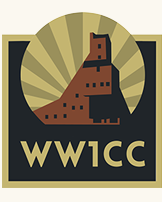Event Title
4A3: World War One & Africa: Contesting History, Nation, and Identity in ‘Western Togoland’
Start Date
29-9-2018 2:30 PM
End Date
29-9-2018 3:45 PM
Description
This paper investigates aspects of the legacies of World War One. In commemorating the 100 years of the start of the Great War, the British Broadcasting Corporation (2014) suggested that only the battlefields and trenches of Europe are invoked when the memory of the Great war is recalled. The \rst battle of the war, however occurred in Africa when the Allied forces in August 1914 invaded Togoland, then a German-occupied territory. This was where the Kamina Funkstation; a short-wave radio transmitter, was stationed to, among others, communicate messages about the war to Germany’s African territories and parts of Europe. The impact of the war remains manifest in Africa. This paper discusses one of such effects: the question of history, nation, and identity in ‘Western Togoland’. Through an archival research, I link the war in Togoland, the division of the territory as a war prize between Britain and France on December 27, 1916 and the formalization of this division on July 20, 1922 by the League of Nations with the creation of British Togoland and French Togoland, to how this division created an avenue for the contestation of ‘nation boundary’ and how ‘nation boundary’ complicates ‘nation identity’ in contemporary times. I gathered written and visual (video and picture) materials from the Library of Congress, YouTube, Facebook, WhatsApp, and Twitter and analyzed the data using Rhetorical-Cultural Analysis (Scott 2003), some approaches in Critical Discourse Analysis and Expulsions, a Globalization theory (Sasen 2014). Findings suggest that the division of Togoland after the war is the trigger for boundary contestations between Ghana and ‘Western Togoland’. For almost the past 10 years, the Homeland Study Group Foundation (HSGF) has been agitating for an independent state of ‘Western Togoland’, which is largely present day Volta, part of Northern and Upper East regions of Ghana or former British Togoland. HSGF declared independence for ‘the State of Western Togoland’ on May 9, 2017 to coincide with May 9, 1956 when British Togoland was integrated into the then Gold Coast (now Ghana) through a plebiscite. Through techniques such as nominalization, perspectivisation, cultural and rhetorical argumentation, the study suggests that some ‘citizens’ of this nation do not identify as Ghanaians although they live within the geographical borders of Ghana. These 'citizens' also hold that the history of Togoland was not ‘appropriately’ documented. The current attempt of HSGF is an effort at contesting and reclaiming the ethos of history, ‘nation boundary’ and identity; legacies of World War One.
4A3: World War One & Africa: Contesting History, Nation, and Identity in ‘Western Togoland’
This paper investigates aspects of the legacies of World War One. In commemorating the 100 years of the start of the Great War, the British Broadcasting Corporation (2014) suggested that only the battlefields and trenches of Europe are invoked when the memory of the Great war is recalled. The \rst battle of the war, however occurred in Africa when the Allied forces in August 1914 invaded Togoland, then a German-occupied territory. This was where the Kamina Funkstation; a short-wave radio transmitter, was stationed to, among others, communicate messages about the war to Germany’s African territories and parts of Europe. The impact of the war remains manifest in Africa. This paper discusses one of such effects: the question of history, nation, and identity in ‘Western Togoland’. Through an archival research, I link the war in Togoland, the division of the territory as a war prize between Britain and France on December 27, 1916 and the formalization of this division on July 20, 1922 by the League of Nations with the creation of British Togoland and French Togoland, to how this division created an avenue for the contestation of ‘nation boundary’ and how ‘nation boundary’ complicates ‘nation identity’ in contemporary times. I gathered written and visual (video and picture) materials from the Library of Congress, YouTube, Facebook, WhatsApp, and Twitter and analyzed the data using Rhetorical-Cultural Analysis (Scott 2003), some approaches in Critical Discourse Analysis and Expulsions, a Globalization theory (Sasen 2014). Findings suggest that the division of Togoland after the war is the trigger for boundary contestations between Ghana and ‘Western Togoland’. For almost the past 10 years, the Homeland Study Group Foundation (HSGF) has been agitating for an independent state of ‘Western Togoland’, which is largely present day Volta, part of Northern and Upper East regions of Ghana or former British Togoland. HSGF declared independence for ‘the State of Western Togoland’ on May 9, 2017 to coincide with May 9, 1956 when British Togoland was integrated into the then Gold Coast (now Ghana) through a plebiscite. Through techniques such as nominalization, perspectivisation, cultural and rhetorical argumentation, the study suggests that some ‘citizens’ of this nation do not identify as Ghanaians although they live within the geographical borders of Ghana. These 'citizens' also hold that the history of Togoland was not ‘appropriately’ documented. The current attempt of HSGF is an effort at contesting and reclaiming the ethos of history, ‘nation boundary’ and identity; legacies of World War One.

